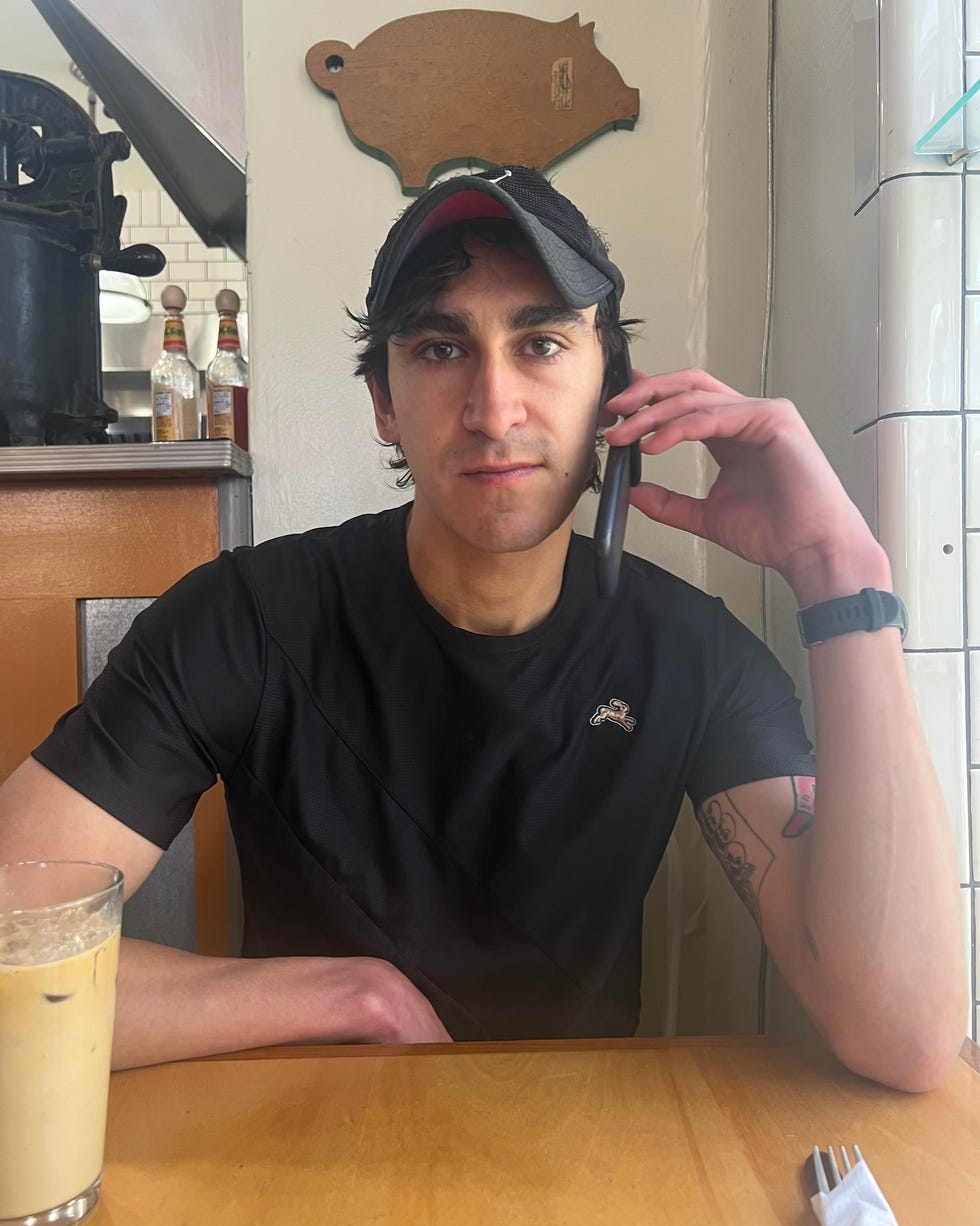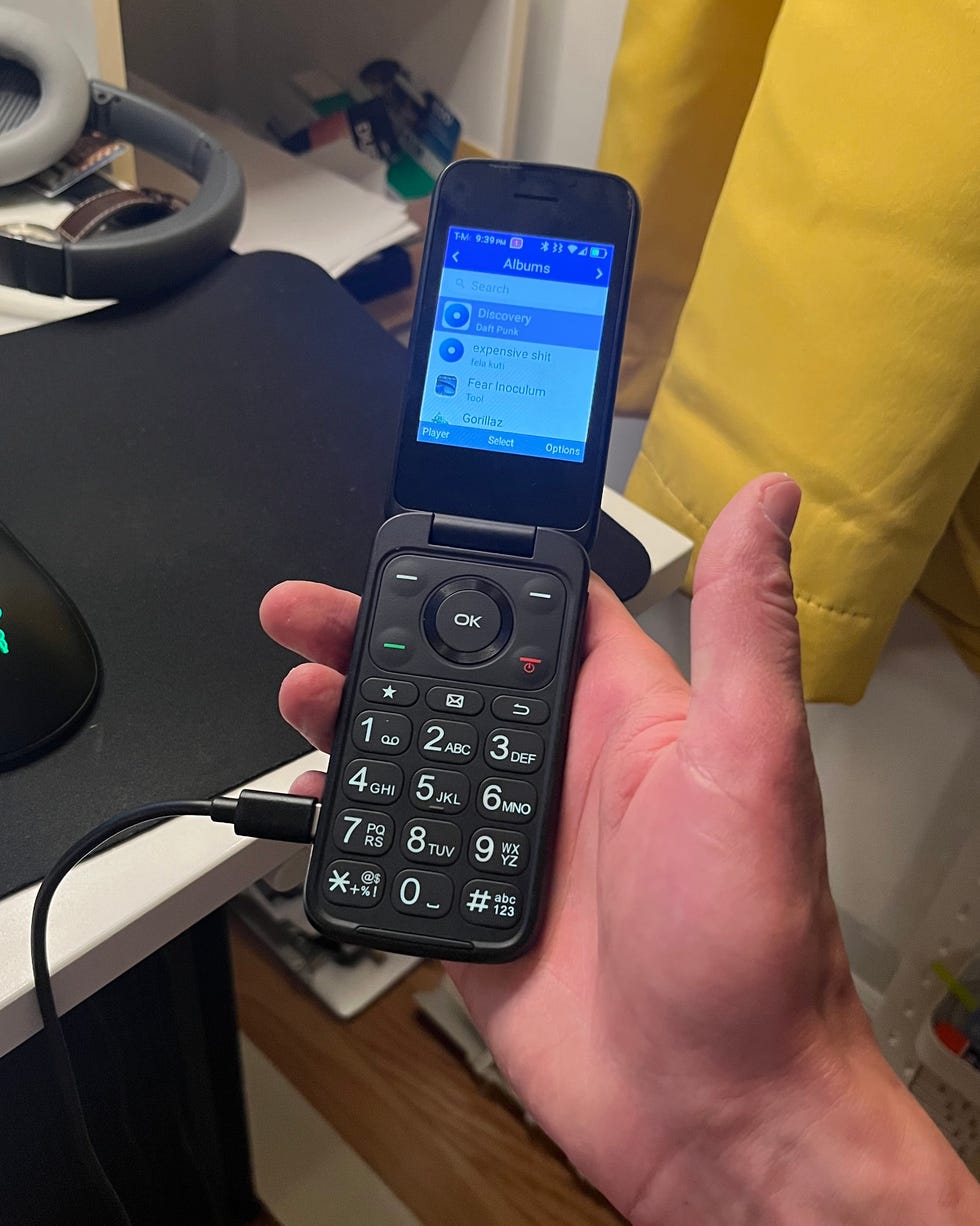What It Feels Like to Live Without a Smartphone

The decision happened on a whim during a visit to my sister in Pittsburgh this past April. She had this basic TCL flip phone sitting unused, the kind you’d buy when your real phone breaks and you need something to get by. “Take it,” she said. I did.
This wasn’t born from some dramatic rock-bottom moment with technology. I wasn’t doomscrolling myself into despair. But as a law student at the University of Michigan preparing for finals, I’d noticed something unsettling: Even after deleting Instagram and removing social apps from my iPhone 13, I was still burning through hours of daily screen time. YouTube videos about subjects I had a passing interest in. Compulsive news checking. The endless, algorithmic pull of just one more thing.
My breaking point was quite mundane. I tried to focus on reading for class, and there was this itch in the back of my mind. My friend had run a marathon, and I wanted to check Strava right then to see how he did. It wasn’t urgent information I needed, but that itch became overwhelming. Inevitably, I opened my phone for one thing and found myself scrolling through ten others, pulled along by the notification cascade.

Making a call with my TCL flip phone.
Recently diagnosed with ADHD, I figured I had enough trouble focusing without carrying a dopamine machine in my pocket.
So I made the switch. The TCL flip phone felt like time travel. Suddenly I was dragging music files from my computer like I did as a kid, planning routes ahead of time, and carrying actual books and a point-and-shoot camera. (The TCL’s camera is heinous.)
The first surprise was how desperately people resist calling you. People hate talking. Texting has become so embedded in how we communicate that asking friends to actually dial my number felt like requesting they send a telegram. Most kept texting my number, which still fed into iMessage on my laptop. I could’ve decommissioned my number from Apple’s ecosystem, but I didn’t; it was nice to still be able to type longer messages when needed.
But when people did call, conversations were more efficient and meaningful. Why spend five minutes pecking out a paragraph on a flip phone when you could just talk? The physical constraint forced better communication.
The second revelation hit me in public spaces. Without a screen to stare at, I started looking up. Really looking. At a museum in Detroit, I struck up a conversation with another phone-free person during a break. On trains, instead of joining the collective head-down posse, I’d scan the car, people-watch, occasionally make accidental eye contact with others. I became very cognizant of how often we are buried in our devices. It felt refreshing but also weird, like being the only person facing the wall in an elevator full of people facing the door.
There’s something unsettling about being the lone person not looking at a device. Everyone oriented downward while you’re scanning the room, reading ads, watching humanity. Sometimes I felt as if I was intruding just by observing the world around me.
Without a map in your pocket, navigation becomes an adventure and occasionally a burden. In familiar Ann Arbor, fine. In new places, I’d have to plan ahead, sometimes get lost, call my girlfriend for cross-street navigation to ask if I was close. Part of me enjoyed the constraint, but I worried I was becoming a friend who couldn’t figure out basic logistics.
Living analog in a digital world also meant carrying more stuff. My small crossbody bike bag became essential, stuffed with a pen and paper for quick notes (typing on a flip phone keypad is torture), a physical train card instead of digital tap-to-pay, and a bike map I rarely used but felt naked without.

I had to manually drag music files from my computer onto my flip phone.
The modern world doesn’t want you to live without a smartphone. QR-code menus at restaurants. Two-factor authentication for school accounts that require an app, not SMS, problematic when your law school basement has no cell signal. I’d have to trudge upstairs to the courtyard just to log into my student portal.
What I missed most wasn’t social media or news alerts—it was podcasts. My daily soundtrack of Philosophize This! and 5–4, NPR during commutes, and legal podcasts that made walking feel productive. My dad had given me an old radio, but lugging that around felt like a bridge too far.
I missed breaking news by hours instead of minutes. Felt disconnected from the real-time pulse of information that smartphones deliver directly to our nervous systems.
But here’s what I didn’t miss: the compulsive checking. The phantom vibrations. The algorithmic rabbit holes that turned “a quick email check” into 45-minute YouTube binges about subjects I didn’t care about.
Friends’ reactions were mostly curiosity mixed with mild envy. One Michigan friend peppered me with questions, genuinely fascinated. A close friend laughed and said, “Of course you’d be the one to do this.” Not mean-spirited, merely unsurprised. I’d braced myself for eye rolls about hipster affectation, but that was mostly my own insecurity. The real confusion came from older generations. My dad, who’d grown up with flip phones, couldn’t understand why I’d voluntarily step backward to technology he’d been eager to escape. To him, it wasn’t minimalism; it was masochism.
After two months, I switched back for a camping trip this summer. I needed GPS for an interstate drive with friends and didn’t want my digital minimalism experiment to hamper their experience. The moment I reactivated my iPhone, the old patterns resurged immediately. Even trying to think about how to collect my thoughts for this essay, I’m fighting the urge to check something, anything, to fill this momentary space with stimulation.
The flip phone taught me that boredom isn’t a problem to be solved. It’s a space to be inhabited. But in a world built for instant gratification, choosing that space requires constant, exhausting vigilance.
esquire



